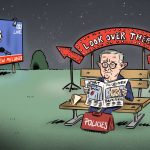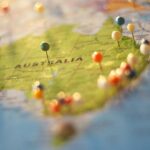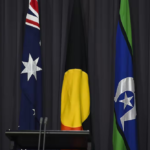A view from the USA
Could it be that the human default position is ruthless self-interest? Denis Tracey spent five weeks travelling in the USA, and it hasn’t left him optimistic about social responsibility.
Five weeks travelling in the USA gives a good opportunity to reflect on social responsibility. Take for instance Aspen, Colorado, said to be the most affluent community in the USA. The airport is crowded with private jets (not small ones either), the shops are full of expensive stuff and slebs of one sort and another jostle happily through the streets. A hundred years ago Aspen was a hardscrabble mining town. It huddles in a valley beneath steep mountains. But these days the lower slopes of the mountains are crowded with enormous holiday houses. A volunteer guide in nearby Beaver Creek told us that there are referred to as 2/2/20/20s: two people; two weeks a year; 20,000 square feet; $20 million.
But Aspen also has an exciting cultural and intellectual life, the streets are clean and there’s a brand new art gallery entirely paid for by local philanthropists (there’s a restaurant on the terrace that serves an excellent lunch and has wonderful views of the mountains).
Aspen seemed to me to represent all the USA hopes to be. And did I mention that cannabis may now be legally purchased throughout Colorado? There’s an outlet quite close to the base of the ski gondola. The staff might seem a bit unfocussed, but are well-informed about the qualities of the goods on sale. It’s a lot like going to a good wine shop.
Next came New York, which has long been regarded as the capital of philanthropy. The honour boards at the Lincoln Center, the Museum of Modern Art and other monuments to high culture carry lots of familiar names – Rockefeller, Carnegie and so on. But notwithstanding the exemplary efforts of modern heroes like Gates and Buffet, it’s hard to avoid the conclusion that rich Americans direct much of their charity towards causes that reflect their and their friends’ interests – the opera, high art and the universities that educate them and their children.
In January President Obama used his State of the Union address to propose taxing the very rich in order to provide relief for the middle classes. But the great shame of New York is not the middle class. It’s the crowds of beggars who line the streets, sitting in the snow with signs proclaiming their homelessness, hunger, illness and despair. They are almost all of them black. Surely we can do better than this, you think.
Las Vegas is a town which needs words much stronger than crass, tasteless and vulgar. The absurd pastiches of Paris, New York and Venice; the ubiquitous poker machines; the lack of any sign of intelligent life all suggest that you are at hell’s front door. But while all this was expected, we were surprised by the number of beggars on the street. These were different from those New York. They were mostly white. Many were maimed and carried signs claiming that they were Vietnam or Iraq veterans. Las Vegas is just awful. Don’t go there.
Could it be that we’re basically a mean species? That while we are sometimes generous with our excess, our default position is ruthless self-interest?
The most interesting book I read in 2014 was Sapiens: A Brief History of Humankind (Harvill Secker, London) by Yuval Noah Harari, which explains that while we humans are the most successful species ever, we haven’t achieved this through being nice. Homo sapiens seems to have wiped out the Neanderthals, the Australian Aborigines seem to have wiped out the local mega-fauna, before being in turn almost wiped out by the Europeans.
The author tells an arresting story:
On 20 July 1969, Neil Armstrong and Buzz Aldrin landed on the surface of the moon. In the months leading up to their expedition, the Apollo 11 astronauts trained in a remote moon-like desert in the western United States. The area is home to several Native American communities, and there is a story – or legend – describing an encounter between the astronauts and one of the locals.
One day as they were training, the astronauts came across an old Native American. The man asked them what they were doing there. They replied that they were part of a research expedition that would shortly travel to explore the moon. When the old man heard that he fell silent for a few moments, and then asked the astronauts if they could do him a favour. ‘What do you want?’ they asked
‘Well,’ said the old man, ‘the people of my tribe believe that holy spirits live on the moon. I was wondering if you could pass an important message to them from my people.’ ‘What’s the message?’ asked the astronauts. The man uttered something in his tribal language, and asked the astronauts to repeat it again and again until they had memorised it correctly. ‘What does it mean?’ asked the astronauts. ‘Oh, I cannot tell you that. It’s a secret that only our tribe and the moon spirits are allowed to know.’
When they returned to their base, the astronauts searched and searched until they found someone who could speak the tribal language, and asked him to translate the secret message. When they repeated what they had memorised, the translator started to laugh uproariously. When he calmed down, the astronauts asked him what it meant. The man explained that the sentence they had memorised so carefully meant ‘Don’t believe a single word these people are telling you. They have come to steal your lands.’
Just now I’m not feeling terribly optimistic about social responsibility.
Denis Tracey lives in Sydney where he teaches and writes about philanthropy and social investment.














Max Thomas
June 29, 2015 at 2:44 am
A view from the USA
I enjoyed reading your blog Denis, thanks for your effort. I’m retired and have done most of the traveling I needed to do in order to better understand my preconceptions. I wonder if after a few months you are still wrestling with the idea that the human ‘default position’ is ruthless self-interest. I often wonder too about the deeper motivation associated with what appears to be self-interest and which manifests as acquisitiveness or greed. Perhaps it comes down to us from prehistoric times when hard seasons or conflict etc, may have deprived us of easy access to resources. And when we behave as though we are invincible, is it to allow us to merely function? I mean, if we really thought we could meet with disaster at any moment, we would be frozen by fear and hesitation. We would certainly not have ventured too far from the cave for fear of being taken by the nearest sabre-toothed cat. I suppose that learning to understand and control these instincts might be the key to a fairer distribution of the things that make life better. An African man told me that his people were good at fishing and growing food; they lived near a river and a lake. Another tribe who visited them were good at fighting. He said that his people would feed the warriors ‘so they would feel strong enough to go away’.